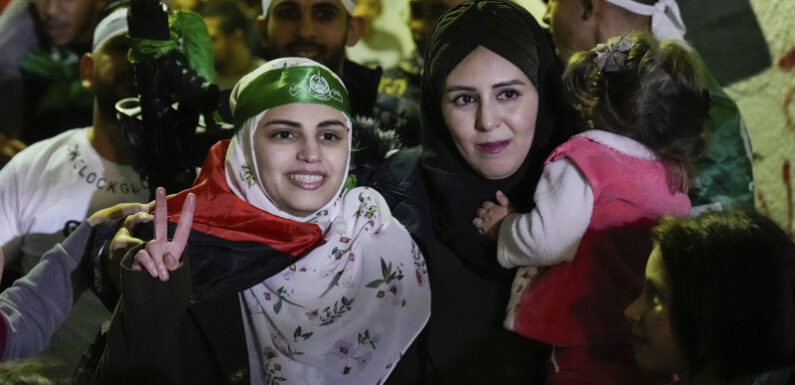
Save articles for later
Add articles to your saved list and come back to them any time.
Balata Camp, West Bank: The newly released prisoners, lit by street lamps and the moon, were received as returning heroes. Teenage boys were draped in the green flag of Hamas and carried high on strong shoulders through the cheering crowd.
To Aseel al-Titi, sitting atop a car, the red, black, white and green Palestinian flag across her back, her first hour of freedom felt electric.
Aseel al-Titi, wearing a Hamas headband, a former Palestinian prisoner who was released by the Israeli authorities, is greeted by friends and family members in Balata.Credit: AP
But when the 23-year-old finally arrived home, almost a year and three months after she left it, she struggled to sleep. Her euphoria was wearing off; suddenly the night felt very quiet. In homes across the Balata refugee camp, televisions broadcast images of the bloodshed in Gaza that had cleared the way for her release.
It was a grim formula, people here said. Three Palestinian prisoners released from Israeli custody in exchange for each Israeli hostage set free by Hamas militants in Gaza.
“Suddenly the feelings I had were so complex that they were just impossible to describe,” al-Titi said as a steady stream of visitors welcomed her back.
“There was just one thing I knew when I was in the prison,” she told one. “The resistance would not abandon its girls.”
News of the first prisoner release on Friday rippled out through Palestinian communities, a small shot of relief, in some cases even happiness, amid what people here say is the most devastating war since the state of Israel was founded in 1948. More than 13,300 Palestinians have been killed in Gaza since Hamas’s surprise attack on Israeli communities on October 7 drew Israel’s ferocious response.
Hamas and other fighters killed about 1200 people in Israel that day and took another 240 hostage. Israel’s goal now is to eradicate the militants from Gaza.
In the occupied West Bank, Israeli forces have killed more than 200 Palestinians and arrested at least 3000 more, accelerating a cycle of violence that already has birthed a new generation of militants, and deepened sympathy here for Hamas, too.
Al-Titi, pale-faced and short on sleep, was wrapped in a thick winter coat as she received visitors in her family’s home down a narrow alleyway in this cramped refugee camp. The walls of the living room were covered with photographs of men in the family who had been arrested or killed by Israeli forces during previous rounds of conflict. On the wall behind her now hung the Hamas flag as well.
“She was always a strong person, but you see it even more now,” said Al-Titi’s sister, Nisreen. “You can see it in her, it’s like suddenly the resistance is inside her.”
Aseel al-Titi is greeted by friends and family in Balata in the West Bank after being released from Israel.Credit: AP
Al-Titi was arrested while visiting her brother Sabea in prison. She was blamed in an altercation with a guard who the family said had asked her to undergo a humiliating physical search. Israeli media have reported that she attempted to stab the guard with a pair of scissors. Her family said she pushed the guard.
She had known the captive exchange was coming, she said. When prison guards confiscated telephones and televisions after October 7, mostly cutting the detainees off from the outside world, a hidden radio became a secret lifeline. The prisoners knew of the Hamas attacks, she said. They knew of the bloodletting in Gaza.
When news arrived of Israeli raids to locate young militants inside the camp, she was terrified. “My brain would be going crazy, thinking, who was hurt? Was it my friends? My family?”
She knew something was wrong the day her cellmates, most of them arrested for petty crimes, tried to turn down the radio when she approached. Her uncle, a member of one of Nablus’ armed groups, had been killed. Hearing that sentence from inside a prison cell “almost broke me”, she said.
Back in Balata, the total lack of contact with al-Titi after October 7 had a similar effect on her mother, Khittam. On Friday, she arrived hours early at the Beitunia municipality to await news of her daughter. She was so excited and anxious she could barely stand still. On Saturday morning, she said her heart was finally at peace. “She’s home,” she said. “She’s my daughter and she’s home, that’s all that could possibly matter to me.”
The Washington Post
Get a note directly from our foreign correspondents on what’s making headlines around the world. Sign up for the weekly What in the World newsletter here.
Most Viewed in World
From our partners
Source: Read Full Article

